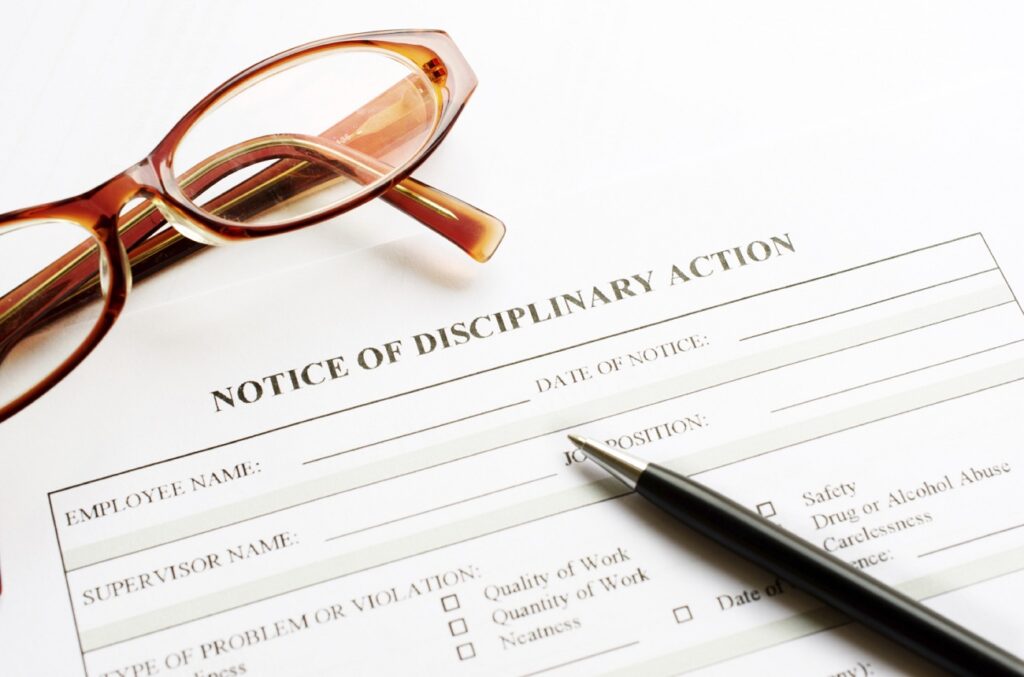Every business should have a disciplinary procedure to help employers deal with situations of misconduct or poor performance in the workplace. While some employers may have a separate capability procedure, others may address performance issues under their disciplinary rules.
Implementing a good disciplinary procedure will promote fairness and transparency across the workforce, as it ensures all employees are treated equally and receive a fair outcome. A good disciplinary procedure not only means that you are acting as a good employer, but it can also prevent procedurally unfair sanctions.
Alleged misconduct – from the beginning
When you are notified of an alleged misconduct, you should carry out a brief initial investigation to help you decide if there is a disciplinary case to answer. Once that is done, you should conduct an investigation on all the allegations.
In some cases, as part of your investigation you should speak to the employee who brought the allegations, any possible witnesses, and the alleged perpetrator.
Before speaking to the alleged employee, you should let them know it is an investigation meeting by sending them an invitation letter.
Every business should have a disciplinary procedure to help employers deal with situations of misconduct or poor performance in the workplace.
In other cases, the investigations stage will involve just collecting evidence or documentation to use at the disciplinary hearing.
It is important that you do not unreasonably delay any part of the disciplinary process and carry out the investigation and disciplinary meetings in time.
Following the collection of evidence
When you have collected any evidence you need and you feel there is a case to answer, you should invite the employee to a disciplinary hearing.
The letter should inform the employee of the allegations and any potential consequences if they are proven to be substantiated. This invitation should contain details of where and when the disciplinary hearing will be held, and it should notify the employee that they have a right to be accompanied.
All workers have a statutory right to be accompanied at disciplinary meetings or appeal meetings where the possible outcomes include a formal warning or other disciplinary action.
It is important that you do not unreasonably delay any part of the disciplinary process.
Along with the invitation letter, you should send the employee copies of any evidence which you have collected. You should give them reasonable notice to allow them time to prepare for this hearing.
‘Reasonable time’ in not defined through legislation, so it is up to the employer’s judgment how much is reasonable and this can vary from case to case depending on the circumstances, allegations or consequences.
For example, you could give an employee more time to prepare if there is a large amount of evidence, compared to less time for a disciplinary hearing which is not heavily led by documents.
What happens post-disciplinary?
After the disciplinary meeting you must decide whether or not any disciplinary action should be taken. If the employee has failed to provide a reasonable defence to the allegations and misconduct is established, then disciplinary action may be justified.
It is the employer’s decision on what sanction the misconduct warrants. A verbal warning may be given if the offence is not of a serious nature and is a proportionate sanction for the employee.
A written warning may be appropriate for first time offences of a more serious nature, escalating to a final written warning if there is a further incident of misconduct in a set period of time following the first disciplinary outcome.
If the employee’s conduct is sufficiently serious, then a final written warning may be appropriate even for a first offence.
In very serious cases where the employee is found to have committed gross misconduct, then summary dismissal with no notice period may be justified but this still requires procedural steps.
Employees should always be given the right to appeal a disciplinary sanction.






